Poor Cow Blu-ray Movie
HomePoor Cow Blu-ray Movie 
Vintage ClassicsStudio Canal | 1967 | 101 min | Rated BBFC: 15 | Jul 25, 2016
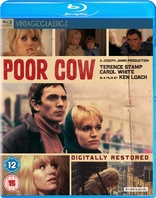
Price
List price:Amazon: £10.99 (Save 27%)
Third party: £10.99 (Save 27%)
Only 3 left in stock.
Movie rating
6.2 | / 10 |
Blu-ray rating
| Users | 4.0 | |
| Reviewer | 4.0 | |
| Overall | 4.0 |
Overview
Poor Cow (1967)
Joy, a wife and mother dissatisfied with her small-time crook husband, Tom, whose petty thievery far outweighs his interest in his family. When Tom is arrested, Joy has a chance to start life anew, and does so with a vengeance.
Starring: Carol White, Terence Stamp, John Bindon, Queenie Watts, Kate Williams (I)Director: Ken Loach
| Drama | 100% |
Specifications
Video
Video codec: MPEG-4 AVC
Video resolution: 1080p
Aspect ratio: 1.67:1
Original aspect ratio: 1.66:1
Audio
English: LPCM 2.0 (48kHz, 24-bit)
Subtitles
English SDH
Discs
Blu-ray Disc
Single disc (1 BD)
Packaging
Slipcover in original pressing
Playback
Region B (locked)
Review
Rating summary
| Movie | 4.0 | |
| Video | 4.5 | |
| Audio | 5.0 | |
| Extras | 4.0 | |
| Overall | 4.0 |
Poor Cow Blu-ray Movie Review
Reviewed by Dr. Svet Atanasov August 6, 2016Winner of Best Actress Award at the Karlovy Vary International Film Festival, Ken Loach's "Poor Cow" (1967) arrives on Blu-ray courtesy of StudioCanal. The supplemental features on the disc include exclusive new interviews with dierctor Ken Loach, writer Nell Dunn, and Terence Stamp; archival interview with Carol White; and more. In English, with optional English SDH subtitles for the main feature. Region-B "locked".
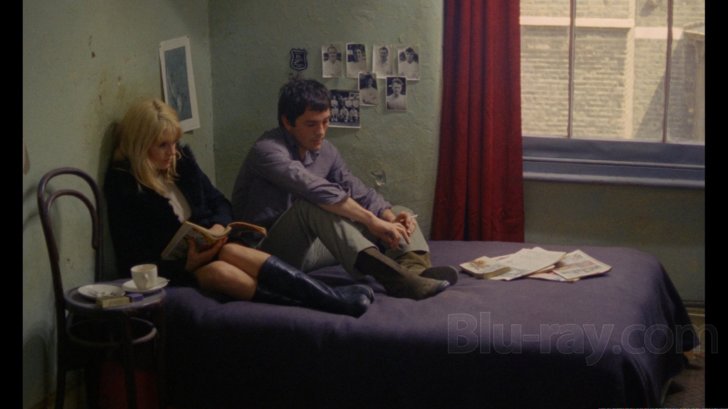
"You better make the fist move or we'll be here all night"
Ken Loach’s directorial debut explores the flip side of the bright and colorful world the swinging London films promoted. It has a rough documentary appearance, but in terms of atmosphere it is nowhere near as bleak and depressing as the big ‘kitchen sink’ dramas are. It is based on the novel of the same name by Nell Dunn, who also collaborated with Loach on the BBC TV adaptation of Up the Junction. Dunn’s first novel was also used by Peter Collinson for a feature film with Suzy Kendall.
Carol White plays Joy, a young and beautiful but quite naïve girl living in a working-class neighborhood of London. In the beginning of the film, she is seen trying to have a meaningful relationship with Tom (John Bindon, Performance), who is a small-time crook without a plan for the future. When Tom makes a wrong move and is sent to prison, Joy is left scrambling to figure out how to take care of their little boy Jonny. Along comes Dave (Terence Stamp, Theorem), one of Tom’s trusted pals, who genuinely likes Joy and is ready to take care of her. For a while they have a good time together, but then Tom also gets busted and is promptly sent behind bars. Initially, Joy assures him that she will wait for him to be released, and they will start from scratch, but soon after she gets a job in a local pub she changes her mind and begins going out with all sorts of different blokes who are willing to give her what she needs.
Loach sees and films London as a divided city, where girls like Joy essentially have two options. The first is settling down for a life of misery. Joy can find a husband from the neighborhood, and for a while they will barely make ends meet. When times get tough, he will start drinking more in the pub, and eventually she will follow him. Then their little family experiment will collapse and both will be left feeling sorry for the time they have wasted lying to each other that their story could have been different from that of every other 'family' in the neighborhood. Joy’s second option is to quickly embrace reality and use her body for financial favors. She won’t be a street worker, but she will frequently be treated as one. For a few years, while men find her fresh and attractive, Joy will have an easy life. Then her place will be taken by another girl, and she will end up in the same pub with the rest of the disillusioned dreamers and losers that did not have the courage to do what she has done.
The film is painfully honest, but not cynical. It offers a slice of the reality in which Joy (and Tom and Dave) is stuck, and lets one ponder her choices. There is a good dose of humor that comes from the many awkward situations Joy finds herself in, but the feeling that she is a lot like a bird locked in a cage is constantly present. There is something incredibly sad knowing that an entire life is wasted like that.
The narrative is broken into multiple segments. The bulk of it is improvised, though Loach apparently had very specific directions for the actors in key sequences. The frank discussions between White and Stamp are wonderful, but elsewhere there is random footage with drunkards and strangers that does not work particularly well.
It is worth pointing out that there is a certain lightness in this film that very much reminds of the work of the Nouvelle Vague directors did in France.
The film does not have an elaborate soundtrack. However, various segments use excerpts from songs performed by Scottish folk rock legend Donovan.
Poor Cow Blu-ray Movie, Video Quality 
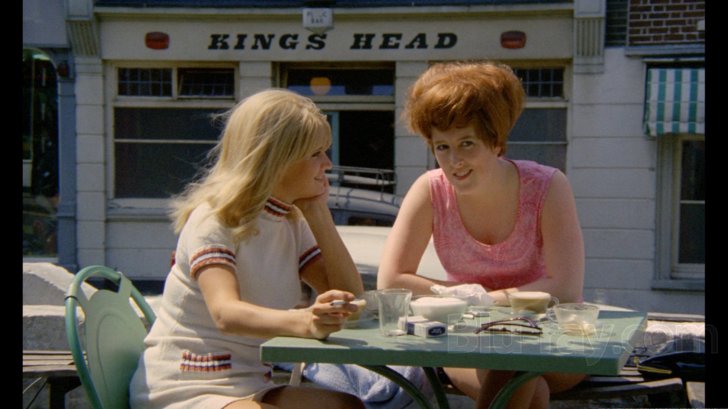
Presented in an aspect ratio of 1.67:1, encoded with MPEG-4 AVC and granted a 1080p transfer, Ken Loach's Poor Cow arrives on Blu-ray courtesy of StudioCanal.
The release has been sourced from a new restored master which has been approved by director Ken Loach. Excluding a couple of examples of extremely light color flutter as well as a few sporadic drops in density, all of which can easily be traced back to the original elements, the film looks simply wonderful in high-definition. The bulk of the outdoor footage where natural light is in abundance looks particularly strong (see screencapture #2). As mentioned above, there are a few segments where density fluctuates, but these fluctuations are not a byproduct of poor digital work (you can see an example in screencapture #12). During the darker footage shadow definition is consistently very pleasing, making it easy to identify smaller details and objects. The primary colors are stable and appear very healthy. There is a good range of nuances as well, though some of the limitations of the production are quite obvious. In other words, the nuances are not as consistent and well balanced as the ones that are typically seen in big-budget productions. There are no traces of problematic degraining or sharpening adjustments. Lastly, there are no large cuts, debris, damage marks, or warped frames to report in our review. My score is 4.75/5.00. (Note: This is a Region-B "locked" Blu-ray release. Therefore, you must have a native Region-B or Region-Free player in order to access its content).
Poor Cow Blu-ray Movie, Audio Quality 
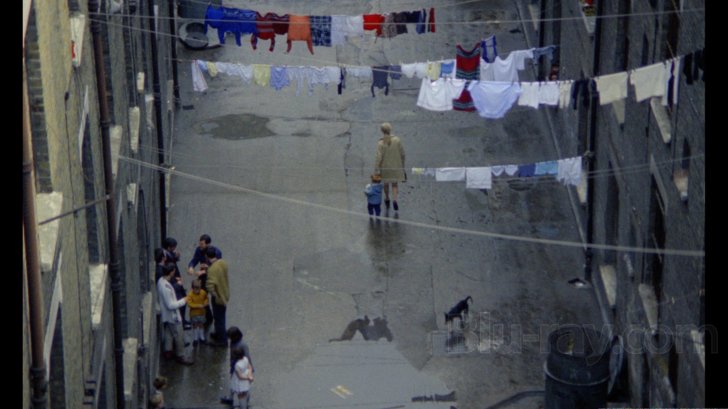
There is only one standard audio track on this Blu-ray release: English LPCM 2.0. Optional English SDH subtitles are provided for the main feature.
The film does not have an elaborate soundtrack. Occasionally excerpts from tracks by Donovan are used, but the music has a secondary role. The dialog and the narration are clean, stable and easy to follow, but some viewers will likely use the optional English subtitles as some of the accents can be quite thick. There are no audio dropouts, pops, background hiss, or digital distortions to report in our review.
Poor Cow Blu-ray Movie, Special Features and Extras 
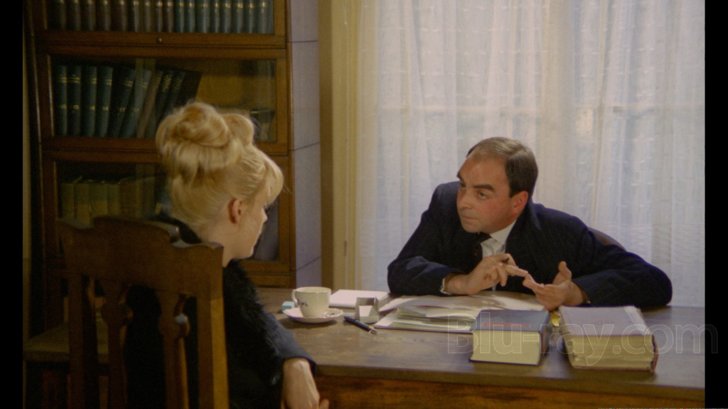
- Interview with Terence Stamp - in this brand new video interview, actor Terence Stamp recalls how he was offered the role of Dave in Poor Cow, and discusses the film's reception, the impact it had on his career, Ken Loach's decision to shoot the film without a script, etc. The interview was conducted exclusively for StudioCanal. In English, not subtitled. (8 min).
- Interview with Ken Loach - in this brand new video interview, dierctor Ken Loach explains how the original idea for Poor Cow developed, and discusses Nell Dunn's novel, some of the thematic similarities between Poor Cow and Peter Collinson's Up the Junction (which is also based on a novel by Nell Dunn), the casting process, Terence Stamp's contribution, the fragmentation of the story, why London was a much more attractive city during the 1960s, etc. The interview was conducted exclusively for StudioCanal. In English, not subtitled. (16 min).
- Interview with Nell Dunn - in this brand new video, writer Nell Dunn discusses her love for London, the fact that her novels (Up the Junction and Poor Cow) openly embrace promiscuity, the TV adaptation of Up the Junction and Ken Loach's contribution, the decision to cast Carol White in Poor Cow and her tragic death, the surprising success of the film and some of its key themes, etc. The interview was conducted exclusively for StudioCanal. In English, not subtitled. (10 min).
- Interview with Carol White - in this archival interview, the late Carol White discusses her involvement with Poor Cow, the fact that she improvises a lot of her dialog/narration, Nell Dunn's novel, etc. The interview was conducted in 1966. In English, not subtitled. (4 min).
- Poor Cow & the British New Wave - in this new featurette, Professor John Hill (Royal Holloway, University of London) and lecturer in film studies Melanie Williams (East Anglia University) discuss the emergence of the British New Wave and the major themes that defined it, Nell Dunn's work, and the tone and narrative structure of Poor Cow. The featurette was produced exclusively for StudioCanal. In English, not subtitled. (11 min).
Poor Cow Blu-ray Movie, Overall Score and Recommendation 
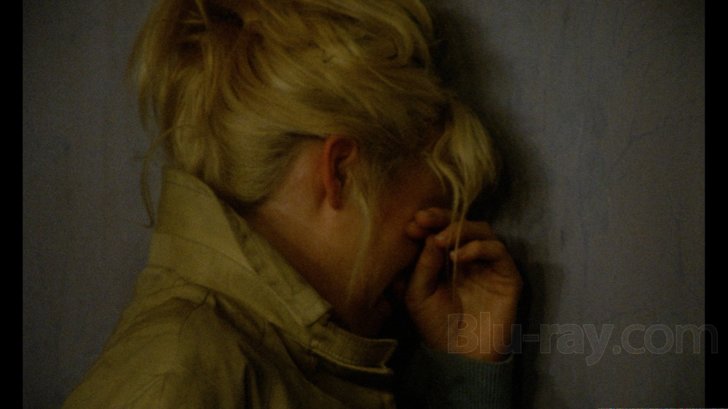
I tend to agree with Ken Loach that Poor Cow is a flawed directorial debut that could have turned out better. However, I still think that it is one of his most important films. Indeed, it is a wonderful time capsule that has managed to effectively preserve the rhythm and atmosphere of London from the 1960s without trying to hide its flaws. Recently restored with Ken Loach's involvement, the film looks the best it ever has. StudioCanal's release also offers good exclusive new interviews with Loach, Terence Stamp, and writer Nell Dunn. VERY HIGHLY RECOMMENDED. (In the United States, local distributors Olive Films have released on Blu-ray Peter Collinson's Up the Junction, which is another very good film based on a novel by Nell Dunn).
Similar titles
Similar titles you might also like

The Pleasure Girls
BFI Flipside
1965

The Servant 4K
Vintage Classics
1963

The System
The Girl-Getters | Indicator Series | Limited Edition
1964

The Image Book
Le livre d'image
2018

Nightbirds
BFI Flipside
1970

Wonderwall - The Movie
Digitally Restored Collector's Edition
1968

Sweet Bean
あん / An | Masters of Cinema
2015

Things to Come
1936

Baby Love
1968

Victim
1961

Love Is the Devil: Study for a Portrait of Francis Bacon
1998

Sunday Bloody Sunday
1971

Here We Go Round the Mulberry Bush
BFI Flipside
1968

Greetings
1968

Saturday Night and Sunday Morning
1960

This Happy Breed
1944

Brief Encounter
1945

Withnail and I 4K
Special Edition
1987

Mogul Mowgli
2020

Bartleby
Indicator Series | Limited Edition
1970